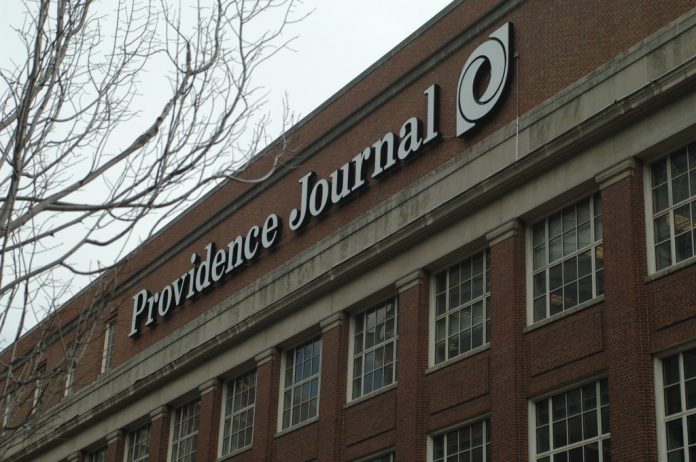
NEW YORK – A group of journalists protesting outside the offices of a New York City hedge fund recently shined a light on a little-known fact about the state of the local American newspaper: Behind the scenes, financial firms often hold all the cards.
Investors like Alden Global Capital LLC, Chatham Asset Management LLC and Fortress Investment Group LLC have acquired ownership stakes in newspapers that have struggled to adapt in an online world, from the Miami Herald to the Providence Journal to the Charlotte Observer. Funds have brought their cost-cutting know-how to help restructure several newspaper chains in heavy debt after the 2008 financial crisis.
But the evolving ownership picture has sparked fresh questions over whether investment firms can really help save local newspapers by making them profitable again — or if they’ll starve them to the point that they collapse instead. The journalists who traveled from cities like Denver and St. Paul earlier this month to join the protests outside Alden Global’s offices are convinced it’s the latter. Some analysts agree.
“They’re not reinvesting in the business,” Ken Doctor, a longtime newspaper analyst and president of the website Newsonomics, said about Alden Global. “It’s dying and they are going to make every dollar they can on the way down.”
Several hedge funds have become newspaper barons in recent years. Alden Global now owns about 60 daily newspapers through a subsidiary, Digital First Media. New Media Investment Group, which is managed and controlled by private-equity firm Fortress, owns almost 150 newspapers in smaller cities like Columbus, Ohio, and Providence through a unit, GateHouse Media. And hedge fund Chatham is one of the largest shareholders and bondholders in McClatchy Co., publisher of the Charlotte Observer and Miami Herald.
Alden Global didn’t respond to a request for comment. A Fortress spokesman said the firm has no role in New Media’s day-to-day operations. In a statement, McClatchy President Craig Forman said Chatham also has no influence on its operating decisions.
Alden Global has made some of the most severe cuts among owners. Last month, employees at its Denver Post, whose staff has shrunk from about 200 to less than 100 in the past eight years, publicly rebuked its owner after being ordered to cut 30 more jobs. In January, GateHouse’s Florida Times-Union in Jacksonville announced plans to cut about two dozen jobs, or 10 percent of its workforce, just one month after saying it would eliminate 50 production positions. In April, McClatchy cut 15 journalists from the Sacramento Bee.
The plight of local newspapers is different from bigger national ones like the New York Times that have developed successful subscription models and large metro outlets like the Boston Globe that have been acquired by billionaire backers.
New Media disputes any suggestion that efforts to slim down its newsrooms are driven by profits.
The company has cut highly paid but unproductive reporters while asking the remaining reporters to write more articles, according to Michael Reed, New Media’s CEO. The company has also eliminated local copy editors and designers and moved those jobs to a central hub in Austin, Texas, where it has hired more than 300 people, Reed said.
“We’re buying newspapers because we think we have a strategy that can save local journalism,” Reed said in an interview, referring to plans to find new revenue sources by selling various services, such as online marketing help, to local businesses.
New Media’s shares are up 36 percent in the past year, and Reed says its profit margins are about 10 percent. Alden’s Digital First Media generated a 17 percent profit margin in 2017, which is more than the New York Times, Doctor said.
While Fortress has “no influence” on how the newspapers are operated, the firm has helped New Media raise funds to buy more newspapers, Reed said. It has also tapped executives who have industry experience. And one of the newspapers under its control, the Sarasota Herald-Tribune, won a Pulitzer Prize two years ago.
But journalists protesting Alden Global’s stewardship of newspapers had plenty of stories to illustrate how cost cuts are gutting their newsrooms. Outside Alden’s offices this month, they shouted into megaphones and held signs reading “Stop Bleeding Our Newsrooms Dry.”
One of the protesters, Patricia Doxsey, is a 60-year-old reporter at the Daily Freeman in Kingston, N.Y.. Doxsey said she had to wear fingerless gloves and a warm hat when the newsroom had no heat on a recent winter day. In the early 2000s, the newspaper had about 200 employees, she said – now it has about two dozen. And the outsourcing of the paper’s printing press to Albany means late-breaking stories aren’t published in print for two days.
“We just want Alden Global Capital to get the hell out of the news business,” Doxsey said. “It has no business owning newspapers. We’re not widgets. If they close us down, the news goes away.”
Gerry Smith is a reporter for Bloomberg News.












